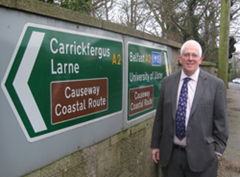Stewart Dickson: local government’s future
 After 32 years of service on Carrickfergus Borough Council, Alliance MLA Stewart Dickson suggests voluntary power-sharing, backed up by strong ethical standards, as the best way forward for local government. Councillors will also need to meet higher expectations from residents as they take control of more services.
After 32 years of service on Carrickfergus Borough Council, Alliance MLA Stewart Dickson suggests voluntary power-sharing, backed up by strong ethical standards, as the best way forward for local government. Councillors will also need to meet higher expectations from residents as they take control of more services.
I strongly support the modernisation and strengthening of local government, which has the potential to be achieved through the much delayed re-organisation of public administration, given that it is executed effectively. There are strong arguments for rationalising the number of district councils, including the requirement to capture economies of scale and to provide more efficient services and enhanced value for money for rate-payers. This must be balanced against the need to reflect local communities and geography, facilitate civic pride and provide citizens with ready access to local, democratically elected decision-makers.
I have a vision of a cohesive, shared and integrated society, where people are safe, have ample opportunities, and are treated fairly and with respect. I want to see a normal society delivered and underpinned by shared values of equality, respect for diversity and interdependence. I am concerned that some of our existing local authorities are conducting their business in a way that is contrary to this positive vision for the future. For example, Antrim, Carrickfergus, Castlereagh and Craigavon councils have all failed or fallen short in fairly allocating positions of responsibility, mainly caused by sectarian and petty politics of the unionist parties failing to move with the times and share the responsibilities of civic and other offices with other parties or, indeed, independent councillors regardless of talent, thus failing to contribute meaningfully in what ought to be a business-like approach to councils and their committee or sub-committee work.
I have raised my concerns with the Minister of the Environment, who has agreed that statutory requirements will need to be in place to ensure fairness in the allocation of positions of responsibility. I believe that this is best delivered through an STV-type process and have explored with the Minister the possibility of councils being offered the freedom to reach a voluntary agreement on the sharing of responsibility, provided it meets a standard of fairness. However, there will be a default mandatory requirement if councils refuse to reach such an agreement.
I see a real opportunity to help build a shared future through the local government reform agenda. What is needed is an effective and flexible approach to guarantee responsibility-sharing and co-operation at council level. Responsibility-sharing is the most effective means to provide for governance in a divided society, and decision-making in local government, as elsewhere, should be underpinned by adherence to best practice, good relations, equality and human rights standards.
I have also raised other issues with the Minister, such as the micro-management of councils by councillors and inappropriate business relationships between councillor groups and council staff. I am confident that the Minister is now aware that these issues need to be dealt with by introducing a statutory code of practice which will have teeth and real power to penalise and, if necessary, remove those who do not abide by the code.
There will also have to be an increase in the level of training received by those elected to the new local authorities, particularly in the area of planning, which is heavily bound in regulation. Councillors will need to have better knowledge of why they can or can’t make certain decisions, otherwise we will spend endless hours and ratepayers’ money in courts.
Councils are best placed to identify local needs and to co-ordinate with other bodies and, accordingly, should be given responsibility for community planning. This power needs to be matched with similar duties being placed upon other agencies of government and their local offices to engage fully with the community planning process. This process must be about much more than simply identifying needs and actions; it also needs to be about joint delivery of goods, facilities and services.
Discussing these reforms raises the important question of who is going to pay. The Minister has asked the Executive for more money, but it is unlikely that any more funding from central government will be forthcoming, leaving the financial burden with rate-payers. If they are to bear the burden of additional costs, they will expect to see a new breed of councillor, delivering fair, competent and cost-effective services across their council area.
The transfer of additional responsibilities to councils, without the associated funding, highlights what many people see as a deteriorating relationship between regional and local government. A new partnership panel could be an effective mechanism to help build relations and mutual confidence between the two tiers of administration.
Looking back on my own 32 years on Carrickfergus Borough Council, I am well aware that many of our achievements depended on a strong working relationship with the then direct rule ministers. Now, however, we have a new model of government in Northern Ireland with an Assembly that needs to develop better relationships with local authorities. I am optimistic that this will be acknowledged and implemented in the spirit that will see us progress purposefully to a meaningful shared future.






